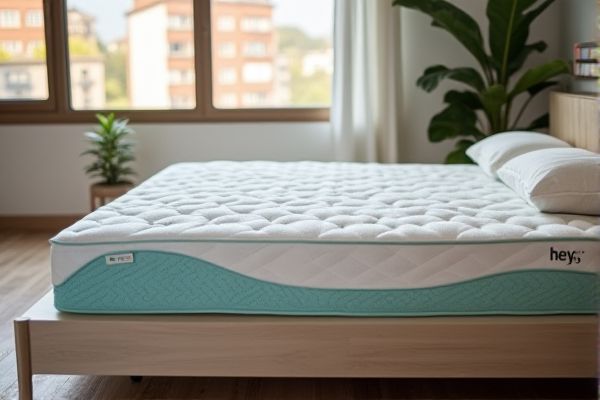
Memory foam mattresses contour to your body, providing pressure relief and motion isolation ideal for side sleepers or those with joint pain. Hybrid mattresses combine innerspring coils with foam layers, offering a balance of support and bounce, perfect for those wanting both comfort and responsiveness--explore the rest of the article to find which mattress suits your sleep needs best.
Table of Comparison
| Feature | Memory Foam Mattress | Hybrid Mattress |
|---|---|---|
| Material | Viscoelastic foam | Combination of innerspring coils + foam layers |
| Support | Contour hugging, pressure relief | Balanced support with coil responsiveness |
| Motion Isolation | Excellent; reduces motion transfer | Good; may vary depending on coil type |
| Pressure Relief | Superior; adapts to body shape | Moderate to high; depends on foam layers |
| Temperature Regulation | Can retain heat; may sleep warm | Better airflow due to coils; cooler sleep |
| Durability | 8-10 years (varies with quality) | 7-10 years; coil quality affects lifespan |
| Price Range | Medium to high | Medium to high |
| Ideal For | Side sleepers, those needing pressure relief | Combination sleepers, those wanting bounce & support |
Introduction to Memory Foam and Hybrid Mattresses
Memory foam mattresses utilize viscoelastic foam to contour closely to Your body, providing pressure relief and motion isolation. Hybrid mattresses combine memory foam layers with innerspring coils, offering a balance of support, responsiveness, and airflow. Choosing between these options depends on Your preference for contouring comfort versus a more traditional bounce and breathability.
Construction and Material Differences
Memory foam mattresses consist primarily of viscoelastic foam layers that conform closely to body shape, providing pressure relief and motion isolation. Hybrid mattresses combine innerspring coils with memory foam or latex layers, offering a balance of support, breathability, and contouring comfort. The coil system in hybrids enhances airflow and responsiveness, while memory foam focuses on body contouring and minimizing motion transfer.
Comfort and Support Comparison
Memory foam mattresses provide contouring comfort and pressure relief by adapting to your body shape, making them ideal for side sleepers or those with joint pain. Hybrid mattresses combine innerspring coils with memory foam or latex layers, delivering a balance of support and bounce suitable for various sleep positions. Your choice depends on whether you prioritize deep body cradling or responsive support with added airflow.
Motion Isolation: Which Mattress Performs Better?
Memory foam mattresses excel in motion isolation by absorbing movement and preventing it from transferring across the bed, making them ideal for couples sensitive to disturbances. Hybrid mattresses combine innerspring coils with memory foam layers, offering moderate motion isolation but often allowing more motion transfer due to the coil system. For superior motion isolation, memory foam mattresses outperform hybrid models by minimizing partner disturbances during sleep.
Temperature Regulation Features
Memory foam mattresses often struggle with heat retention due to their dense structure, which can trap body heat and cause discomfort during sleep. Hybrid mattresses incorporate innerspring coils combined with foam layers that promote better airflow, enhancing temperature regulation and keeping your body cooler throughout the night. Choosing a hybrid mattress may offer superior heat dissipation for you, especially if temperature control is a priority for restful sleep.
Durability and Longevity
Memory foam mattresses generally offer excellent durability, with high-density foams maintaining support and shape for 7 to 10 years. Hybrid mattresses combine memory foam layers with innerspring coils, enhancing breathability and structural integrity, often extending lifespan to 8 to 12 years. Proper care and quality materials significantly influence the longevity of both mattress types.
Price Range and Value for Money
Memory foam mattresses typically range from $500 to $2,000, offering excellent pressure relief and motion isolation that justify their price for many buyers. Hybrid mattresses, priced between $800 and $3,000, combine memory foam with innerspring coils to provide enhanced support and durability, often delivering better value for those seeking a balance of comfort and longevity. Your choice should consider budget limits alongside specific sleep preferences to maximize investment in a quality mattress.
Suitability for Different Sleep Positions
Memory foam mattresses conform closely to the body, providing excellent pressure relief and support for side sleepers by contouring to natural curves, while back sleepers benefit from spinal alignment and reduced pressure points. Hybrid mattresses combine innerspring coils with foam layers, offering balanced support and responsiveness, making them ideal for combination sleepers who shift positions frequently. Stomach sleepers may find hybrid mattresses preferable due to their firmer surface that prevents excessive sinking, maintaining proper spine alignment.
Pros and Cons of Memory Foam Mattresses
Memory foam mattresses offer excellent contouring support and pressure relief by molding to Your body shape, reducing motion transfer for a better night's sleep. However, they can retain heat, making them less ideal for hot sleepers, and may have a slower response time when changing positions. Durability varies with density, and some users may experience off-gassing odors initially.
Pros and Cons of Hybrid Mattresses
Hybrid mattresses combine the support of innerspring coils with the comfort of memory foam or latex layers, offering balanced contouring and responsiveness. Pros include enhanced airflow for better temperature regulation, strong edge support, and durability, while cons involve higher cost, potential noise from coils, and a heavier weight compared to all-foam options. Hybrid mattresses suit sleepers seeking pressure relief without sacrificing bounce or support but may be less ideal for those wanting a quieter or lighter mattress.
 homyna.com
homyna.com